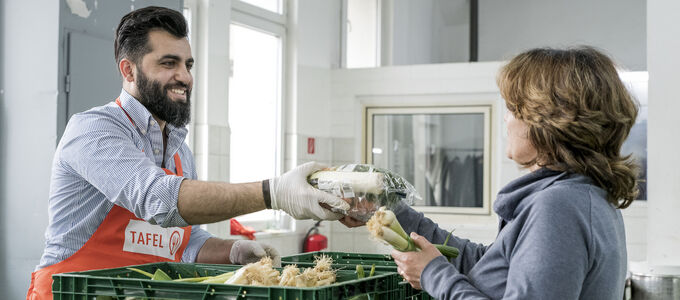Humanitarian aid passes the one million mark

The Covid-19 pandemic has left its mark particularly in the field of charitable and humanitarian work. This is shown in the financial report for 2020 that human aktiv, the aid organisation of the New Apostolic Church Southern Germany, recently presented.
For the first time, human aktiv has spent more than one million euros for aid. The amounts spent by its predecessor organisation, Missionswerk, were significantly higher, but this also included numerous Church activities. The focus of the new organisation, human aktiv, is solely on charitable activities.
It was also possible to crack the one million mark because of the increase in donations compared to the previous year. About 300,000 euros remain, which will be set aside for aid projects in the coming years.
Restricted and unrestricted donations
The trend already observed in the previous year continued in 2020: donations for specific causes accounted for the largest share with more than 862,000 euros. Unrestricted donations received by human aktiv amounted to nearly 732,000 euros. 4,500 euros from other sources of income completed last year’s income, bringing the total to almost 1.6 million euros.
The pandemic demanded more humanitarian response
Covid-19 became a global pandemic in 2020. For this reason, human aktiv supported many projects to combat the problems brought on by the coronavirus pandemic in Germany and many other countries.
The charity donates about 50,000 euros annually to food banks in Germany, where people can buy food at very low prices. Due to the pandemic, the needs of many people have increased, yet at the same time food banks were receiving fewer food donations. That is why human aktiv provided the food banks with nearly 100,000 euros that year.
Abroad, for example, the charity provided emergency Covid-19 aid in African countries. Unusually heavy rains regularly flood roads and houses in Djibouti. In 2020, Covid-19 exacerbated the existing problems, adding to the humanitarian situation. The German aid organisation responded by sending face masks, medical gloves, soap, and food. In Guinea the aid organisation has been supported a health project for students and their families since 2011. This project has been extended and soaps have been distributed to the schoolchildren.
Funding priorities and disaster relief
In addition to providing Covid-19 aid, human aktiv also supported many other projects in 2020. The charity spent about 75,000 euros on its annual funding priority, Family Relief Services. Funding started in 2019, but due to the high demand it was continued the following year. The money is used to support families who have a child with special needs. The aim is to help and strengthen the families and allow the caregivers in the family some free time and to provide socio-educational support and advice. human aktiv specifically funds offers and initiatives that are not supported by other agencies.
More than 80,000 refugees live in Zambia. They have fled to Zambia from neighbouring countries because of political unrest and armed conflicts. NACRO (New Apostolic Church Relief Organisation), the aid organisation of the New Apostolic Church Zambia is organising aid locally. In the Mantapala refugee settlement, in which 15,000 refugees from the DR Congo have found shelter, NACRO is improving access to clean water and building sanitary facilities to prevent disease. human aktiv as well as the New Apostolic Churches Western Germany and Northern and Eastern Germany support NACRO financially.
Reduced administrative costs
The objective of the charity is to spend as little as possible on administration. Last year, the total expenditure on administration was less than one per cent of all expenditures. One reason for this was the extremely low costs for the annual general meeting and the board meeting. Because of the pandemic these could not be held on site for most staff. And the costs for the Zoom meeting were only 22 euros.
Nikolaus Urban, Tafel Deutschland e.V.




